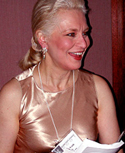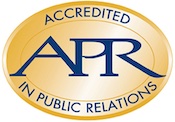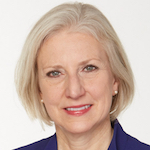 Bill Murray, the resigned CEO of PRSA, was the worst Society staff head we have experienced since 1968--temperamentally and physically unsuited for the job. This mistake must not be repeated.
Bill Murray, the resigned CEO of PRSA, was the worst Society staff head we have experienced since 1968--temperamentally and physically unsuited for the job. This mistake must not be repeated.
We hope to recruit a dozen PR veterans who will make a thorough study of this situation and work to prevent the hiring of another square peg for a round hole. The best elements of PR (public exposure) and the law (cross-examination, detailed exhibits) will be marshaled.
The Society’s habit is to keep its COOs for six or more years, mostly out of pure laziness. It’s just too much trouble to hunt down, negotiate with, and hire a new COO. Few viable candidates are showing up and we can guess why.
What happens is that a non-PR person is hired to head a staff that is just about bereft of PR people. The out-of-towners who run the Society don’t want to share power with New Yorkers.
Murray’s Flaws Were Obvious
How was Murray picked when he showed an immediate aversion to being questioned (the Auburn “interview” where he demanded questions in advance and would not let the students talk to him directly) and the fact that he had a speech impediment (spasmodic dysphonia)?
It’s fine to hire the handicapped but not if the handicap interferes with job performance. Murray was supposed to be a “charismatic leader," someone with a "vision of PR," and "an accomplished public speaker," the search committee said.
Why was he hired? The seven-member search committee, a flawed group if ever there was one, craved someone with “status.” Murray was at the Motion Picture Assn. and that seemed to fill the bill.
Voth Must Not Be on Committee
 The search committee had one member who never should have been on it—Karla Voth, the Society’s VP of special events which includes the annual conference.
The search committee had one member who never should have been on it—Karla Voth, the Society’s VP of special events which includes the annual conference.
Voth, then with the Society 16 years and now with it 23 years, was in the position of hiring her own boss. She was going to favor someone who would not interfere with the Society’s biggest event, the annual conference attended by only 4% of members. That statistic is from 2005 president Judith Phair and it’s also borne out by succeeding attendance lists.
This year’s conference is in D.C. Oct. 11-14 although it was just there in 2010. Tab is $1,195 if paid by Aug. 22. The Society website had previously said that registrations were needed by March 1 to qualify for the lower rate, the regular member rate being $1,495.
Voth, Murray, chair Joe Cohen and VP-corporate development John Robinson were at the Springfield, Va., Country Club Saturday, March 1, promoting the conference. It could be they are worried about attendance. Murray resigned from the Society on March 7, less than a week later.
 Conference “Tail” Wags the Society
Conference “Tail” Wags the Society
Far too much time and money is spent on the conference which is a boondoggle for a select few.
Staff get to travel all over the country looking at sites and making arrangements. More than half the staff goes to the conference. Educators, the dominant group at the Society (replacing counselors), flock to the event, earning credits as conference speakers and insuring that the sacred APR credential remains untouched
Logically, it should be in New York every year because the city has at least 20 times as many “communicators” (PR people, reporters, media, ad people, financial and IR people, etc.) as any other city. The largest Society conference by far was in New York in 2004 (4,000 attendance). The conference is the “tail” that wags the Society “dog.” New York is a big draw—52 million visitors in 20013.
2006 Search Committee Was Flawed
|
Miller |
Other members of the 2006 search committee were its chair, Debra Miller, then at Clark University, Atlanta, as senior director, marketing and communications, who was also an associate professor, special assistant to the president, and assistant dean, Florida Int'l University, from 1989-98; Robert Pritchard of Ball State University, chair of the Educators Academy; Pender McCarter, IEEE-USA, a technical assn.; David Rickey, then VP-PR, Alfa (insurance) Corp., a highly active leader who was national treasurer in 2012; Grace Leong, president of Hunter PR, former Society board member, and Ellen Shedlarz, head of Human Resources, Hill+Knowlton Strategies, who was not a member of the Society. Critics wondered why there were no major corporate or PR firm executives and no major chapter presidents.
The committee thus had one working academic (Pritchard); one previous academic (Miller); two association people, two counselors and one corporate person. It was a committee wedded to the mistaken culture of the Society which is to have a staff almost totally devoid of PR people headed by a non-PR person. The Society was sent on this fatal path by 1980 president Patrick Jackson, Rye, N.H., counselor, whose attitude to the press was “duck ‘em, screw ‘em, and go direct.”
Society COOs until the revolution led by Jackson were press-friendly. Rea Smith, staff head for much of the 1970s, was a career PR person who welcomed reporters to the Society’s midtown h.q. and let them use the library. Reporters were recruited as Silver Anvil judges. Her predecessor, Quentin Harvell, had no problems with press relations.
With the arrival of Betsy Kovacs, COO from 1980-93, Smith was bumped to the Society’s Foundation, given an office on Madison ave., and barred from ever entering Society offices. A widow, whose husband was PR practitioner Shirley Smith, Rea Smith was found dead in her bathtub at the age of 63. Some suspected she committed suicide.
Leong’s firm was founded by 1984 Society president Barbara Hunter and we count Leong as highly loyal to the staff and the traditions of the Society.
Miller, recipient of the Society's Gold Anvil in 2006 and who was president of the Society in 1997, its 50th anniversary year, became director of PR, University of Portland in May 1998, holding that post until September 2000. From August 2000 to September 2001 she was a senior consultant, Sinickas Communications. She was VP of marketing and communications, Bank of America, from September 2001 to October 2003. She was senior A/S and consultant, JacksonHeath Group, from September 2003 to September 2005. She was at Clark from September 2004 to September 2008 when she joined Aurora Health Care as VP, corporate affairs, serving as VP of philanthropy at Aurora from November 2009 until November 2010. She is now director of marketing communications, Quarles & Brady, Milwaukee, law firm with 400 lawyers.
Two, Maybe Three Candidates Found
Miller said the search committee came up with two and maybe three candidates that it recommended to the board. She said the responsbility for picking Murray rests with the board. She could not recall the name or names of the other candidates and would not seek this information from other search committee members or the Society staff. She said the identity of the other one or two candidates "belongs to the Society."
An executive with a New York non-profit health organization came up to us at a PR function in 2007 and said he was the co-finalist with Murray for the Society job. Perhaps this person will contact us now.
Rickey is one of the most loyal and entrenched of the Society’s leaders, serving as the first chair of the Ethics Board who did not previously serve on the EB; heading the bylaws re-write committee of 2009, and heading the 2012 PR defined task force.
We count McCarter as a highly loyal Society leader. He is a past chair of the College of Fellows.
Why Ellen Shedlarz was on the committee is a mystery to us. She was not a Society member. H+K is part of the WPP Group empire which keeps its distance from the press. H+K was once one of the most press-friendly agencies but hasn’t been for decades.
Significant is that the seven-member committee had three from the South—Rickey, Miller and McCarter. Correct geo balance would be one. The Society for too long has been dominated by its Southern members.
Past COOs Reviewed
Kovacs was an association professional. She had one senior PR person on staff during her 13-year term—Donna Peltier. Kovacs kept her distance from us, lunching just three times. Peltier was not allowed to lunch with us unless Kovacs was present.
Succeeding Kovacs was another non-PR person—career ad man Ray Gaulke. He signaled his and the board’s attitude towards us with a grandstand play at the 1994 conference.
We were sitting with the New York delegation as we had for decades when Gaulke came down from the stage where he was seated with the board, took us by the arm, and marched us out of the Assembly area with orders never again to set foot in it. Not a peep arose from either the New York chapter or any of the 250 delegates, most of whom no doubt vastly enjoyed this putdown of a journalist.
Following that eviction, we could only cover the Assembly from the back of the room.
Society was “Silent Partner” to Lawsuit
Gaulke and the board were also in charge of the Society when we got sued for $21 million in early 1994 on charges of copyright violation, inaccurate reporting, and libel by Dean Rotbart of The Journalist & Financial Reporting. We had covered a speech of Rotbart at the 1993 conference at which he criticized many of the practices of financial journalists including their tendency to be influenced by news sources and advertisers.
The Society was up to its ears in this suit because it had two videotapes of the Rotbart speech which it refused to sell to anyone and which would have shown how accurate our coverage of Rotbart was. We went to Gaulke’s office with a copy of the suit, noting we were “credentialed” by the Society and asking for support and the videotape. Gaulke said he would take it up with the Society’s law firm, Moses & Singer. No help came. This link tells the story of the failed attempt to sue the O’Dwyer Co. out of business.
Gaulke’s command and control style was also evident when, in response to a group called the PR Service Council, which lobbied for better treatment of exhibitors at the national conference, he asked to address one of their lunches. He told the flabbergasted group at the meeting in 1995 that the exhibit hall was being closed. It did not reopen until 1999 (until after the Service Council had folded).
Cathy Bolton Was Emergency COO
Gaulke, after receiving a five-year contract from the 1999 board headed by Sam Waltz, suddenly left the Society as of 2001 to work for its Foundation. His contract was reportedly bought out for $250K.
With the removal in 1999 of Atlanta counselor Lee Duffey as a contender for chair-elect (following charges his firm was using a front group in a PR battle vs. the EIFS form of construction), power in the Society passed to a group of Northeasterners headed by Kathy Lewton, Maria Russell and Anthony D’Angelo.
They installed as COO PR practitioner Cathy Bolton, who joined in September 2000 as the first "chief PR officer."
Previously with the Int’l Copper Assn., Akzo Nobel and WNET-TV, she had no experience in supervising a 50-person staff. A Society staffer, using the name “Catherine Hater,” e-mailed the board in 2005 saying she “cannot manage or lead an organization” and that her “quarterly reports to staff are garbage, often met with rolling eyes.” The writer urged the board to “boot Bolton and pay her severance” and said staff morale was “at an all-time low.”
She sought the identity of the staffer, called “John Doe” in the legal papers, for the purpose of suing him or her for libel. The staffer, apparently someone with means, hired a law firm and fought the action. The legal proceedings were given front page coverage in the New York Law Journal.
Bolton found out the identity of the critic but no suit was ever filed. New York Superior Court ruled Bolton had a “prima facie” case for libel charges. The Court removed the board from the legal action saying there was no evidence the offending comments were received by anyone but the board. Bolton’s quest send the criticisms far and wide.
The Law Journal had a half-page reprint of the Court’s decision that provided the name of owner of the e-mail address to PRSA’s law firm. Had “Doe” appealed the decision, it would have been a precedent-setting case in New York and subject to wide attention, the Law Journal noted.
Bolton held the post for six years, receiving a severance payment of $300,000 and $28,000 yearly in pension benefits when she left at the end of 2006. She had given a year’s notice that she would leave.
Bolton was an ardent supporter of the move of h.q. downtown to 33 Maiden lane under a 13-year-lease. The Assembly had no chance to discuss this momentous change, which virtually eliminated use of h.q. by New York PR people, most of whom were in midtown. The new h.q. was presented to the 2003 Assembly as a “done deal.”
Lewton in 2001 took back the title of president, which had been given to Gaulke. The Society had decided against making another search for an outsider since the lengthy search for the previous COO had turned up only two viable candidates–Gaulke and New York counselor Mitch Kozikowski.
Control of the Society passed again from the Northeast to the South and West. Newly dominant were Rhoda Weiss of Los Angeles, Jeff Julin of Denver, Del Galloway of Jacksonville, Fla., and Rickey of Birmingham, Ala.
The Southern-dominated leadership went back to a "command-and-control" association executive—Murray.



 PRSA-NY today announced its five honorary co-chairs for its Big Apple Awards ceremony gala slated for TAO Downtown on Nov. 15.
PRSA-NY today announced its five honorary co-chairs for its Big Apple Awards ceremony gala slated for TAO Downtown on Nov. 15. PRSA-NY president Carmella Glover today issued a "heartfelt apology" on behalf of the chapter for her Oct. 14 message that "caused disappointment and hurt to some of our valued members."
PRSA-NY president Carmella Glover today issued a "heartfelt apology" on behalf of the chapter for her Oct. 14 message that "caused disappointment and hurt to some of our valued members." The leadership of Public Relations Society of America is backing a move to change the current “must-have” APR accreditation to “strongly preferred” as a requirement for a seat on its board of directors.
The leadership of Public Relations Society of America is backing a move to change the current “must-have” APR accreditation to “strongly preferred” as a requirement for a seat on its board of directors. Public Relations Society of American today named Linda Thomas Brooks CEO, succeeding CFO Phil Bonaventura, interim chief since July 2019.
Public Relations Society of American today named Linda Thomas Brooks CEO, succeeding CFO Phil Bonaventura, interim chief since July 2019.


 Have a comment? Send it to
Have a comment? Send it to 
No comments have been submitted for this story yet.